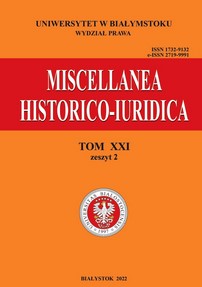Klauzula rebus sic stantibus (art. 269 kodeksu zobowiązań) w warunkach okupacji niemieckiej w Generalnym Gubernatorstwie w świetle tez prawnych polskich (nieniemieckich) sądów
Rebus sic stantibus Clause (Article 269 Code of Obligations) in the Conditions of the German Occupation in the General Government. The Perspective of the Polish (Non-German) Courts Legal Theses
Author(s): Hubert MielnikSubject(s): History of Law, Civil Law, Government/Political systems, WW II and following years (1940 - 1949)
Published by: Wydawnictwo Uniwersytetu w Białymstoku
Keywords: civil law; rebus sic stantibus; General Government; World War II; Code of Obligations;
Summary/Abstract: The article aims to examine how the rebus sic stantibus clause (Article 269 of the Code of Obligations) was interpreted by Polish (non-German) courts in the General Government. The legal theses issued by these courts will be examined. It was an institution that was used to unify the jurisprudence, regarding the liquidation of the Supreme Court. The period of war and occupation was an extraordinary situation, that undoubtedly influenced the contractual relations between the parties. In the Code of obligations of 1933, the Polish legislator introduced the rebus sic stantibus clause, which allowed for judicial interference in contractual relations in the event of extraordinary accidents. It is interesting how the legal order of the General Government reacted to these circumstances. The paper uses archival sources, in which legal theses of Polish (non-German) courts, regarding the issue of the article, were found. Legal theses were not officially published, hence the need to select and develop archival material. A review of the most significant dogmatic-legal and historical-legal literature on the issue of the rebus sic stantibus clause is also presented in the paper. The next problem discussed will be whether Polish (non-German) courts complied with the conditions of application of Art. 269 of the Code of Obligations, including those developed by pre-war jurisprudence and doctrine. The problem is what, in the light of the jurisprudence, under the conditions of occupation, was meant by „extraordinary accidents”, whether the courts interpreted this notion narrowly or broadly. The research hypothesis of the article assumes that Polish (non-German) courts during the German occupation used the rebus sic stantibus clause only after meeting the conditions specified by the legal order.
Journal: Miscellanea Historico-Iuridica
- Issue Year: 21/2022
- Issue No: 2
- Page Range: 245-268
- Page Count: 24
- Language: Polish

